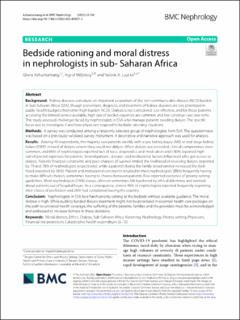| dc.description.abstract | Background
Kidney diseases constitute an important proportion of the non-communicable disease (NCD) burden in Sub-Saharan Africa (SSA), though prevention, diagnosis and treatment of kidney diseases are less prioritized in public health budgets than other high-burden NCDs. Dialysis is not considered cost-effective, and for those patients accessing the limited service available, high out-of-pocket expenses are common and few continue care over time. This study assessed challenges faced by nephrologists in SSA who manage patients needing dialysis. The specific focus was to investigate if and how physicians respond to bedside rationing situations.
Methods
A survey was conducted among a randomly selected group of nephrologists from SSA. The questionnaire was based on a previously validated survey instrument. A descriptive and narrative approach was used for analysis.
Results
Among 40 respondents, the majority saw patients weekly with acute kidney injury (AKI) or end-stage kidney failure (ESKF) in need of dialysis whom they could not dialyze. When dialysis was provided, clinical compromises were common, and 66% of nephrologists reported lack of basic diagnostics and medication and > 80% reported high out-of-pocket expenses for patients. Several patient-, disease- and institutional factors influenced who got access to dialysis. Patients’ financial constraints and poor chances of survival limited the likelihood of receiving dialysis (reported by 79 and 78% of nephrologists respectively), while a patient’s being the family bread-winner increased the likelihood (reported by 56%). Patient and institutional constraints resulted in most nephrologists (88%) frequently having to make difficult choices, sometimes having to choose between patients. Few reported existence of priority setting guidelines. Most nephrologists (74%) always, often or sometimes felt burdened by ethical dilemmas and worried about patients out of hospital hours. As a consequence, almost 46% of nephrologists reported frequently regretting their choice of profession and 26% had considered leaving the country.
Conclusion
Nephrologists in SSA face harsh priority setting at the bedside without available guidance. The moral distress is high. While publicly funded dialysis treatment might not be prioritized in essential health care packages on the path to universal health coverage, the suffering of the patients, families and the providers must be acknowledged and addressed to increase fairness in these decisions. | en_US |

